This is a follow-on question to AWS Transcribe S3 .wav file to text. I use a stream to read and send a .wav file contents to AWS.
Instead of getting back the correct transcript, I get nonsense like a bunch of "Yeah." statements. It looks like AWS isn't able to interpret the byte stream correctly, but I'm not sure what's wrong. I'm wondering if the file needs to be encoded somehow, ie, I can't send the raw .wav bytes straight from the file? Or perhaps I need to tell the service that this is .wav format?
What's wrong here? The input file is a valid .wav voice file that sounds intelligible when I listen to it.
Here is my java code:
package com.amazonaws.transcribe;
import org.reactivestreams.Publisher;
import org.reactivestreams.Subscriber;
import org.reactivestreams.Subscription;
import software.amazon.awssdk.core.SdkBytes;
import software.amazon.awssdk.regions.Region;
import software.amazon.awssdk.services.transcribestreaming.TranscribeStreamingAsyncClient;
import software.amazon.awssdk.services.transcribestreaming.model.*;
import javax.sound.sampled.*;
import java.io.*;
import java.net.URISyntaxException;
import java.nio.ByteBuffer;
import java.util.List;
import java.util.concurrent.CompletableFuture;
import java.util.concurrent.ExecutionException;
import java.util.concurrent.ExecutorService;
import java.util.concurrent.Executors;
import java.util.concurrent.atomic.AtomicLong;
public class TranscribeFileFromStream {
private static final Region REGION = Region.US_EAST_1;
private static TranscribeStreamingAsyncClient client;
public static void main(String args[]) throws URISyntaxException, ExecutionException, InterruptedException, LineUnavailableException {
System.out.println(System.getProperty("java.version"));
client = TranscribeStreamingAsyncClient.builder()
.region(REGION)
.build();
try {
CompletableFuture<Void> result = client.startStreamTranscription(getRequest(16000),
new AudioStreamPublisher(getStreamFromFile()),
getResponseHandler());
result.get();
} finally {
if (client != null) {
client.close();
}
}
}
private static InputStream getStreamFromFile() {
try {
File inputFile = new File("~/work/transcribe/src/main/resources/story/media/Story3.m4a.wav");
InputStream audioStream = new FileInputStream(inputFile);
return audioStream;
} catch (FileNotFoundException e) {
throw new RuntimeException(e);
}
}
private static StartStreamTranscriptionRequest getRequest(Integer mediaSampleRateHertz) {
return StartStreamTranscriptionRequest.builder()
.languageCode(LanguageCode.EN_US)
.mediaEncoding(MediaEncoding.PCM)
.mediaSampleRateHertz(mediaSampleRateHertz)
.build();
}
private static StartStreamTranscriptionResponseHandler getResponseHandler() {
return StartStreamTranscriptionResponseHandler.builder()
.onResponse(r -> {
System.out.println("Received Initial response");
})
.onError(e -> {
System.out.println(e.getMessage());
StringWriter sw = new StringWriter();
e.printStackTrace(new PrintWriter(sw));
System.out.println("Error Occurred: " + sw.toString());
})
.onComplete(() -> {
System.out.println("=== All records stream successfully ===");
})
.subscriber(event -> {
List<Result> results = ((TranscriptEvent) event).transcript().results();
if (results.size() > 0) {
if (!results.get(0).alternatives().get(0).transcript().isEmpty()) {
System.out.println(results.get(0).alternatives().get(0).transcript());
} else {
System.out.println("Empty result");
}
} else {
System.out.println("No results");
}
})
.build();
}
private static class AudioStreamPublisher implements Publisher<AudioStream> {
private final InputStream inputStream;
private static Subscription currentSubscription;
private AudioStreamPublisher(InputStream inputStream) {
this.inputStream = inputStream;
}
@Override
public void subscribe(Subscriber<? super AudioStream> s) {
if (this.currentSubscription == null) {
this.currentSubscription = new SubscriptionImpl(s, inputStream);
} else {
this.currentSubscription.cancel();
this.currentSubscription = new SubscriptionImpl(s, inputStream);
}
s.onSubscribe(currentSubscription);
}
}
public static class SubscriptionImpl implements Subscription {
private static final int CHUNK_SIZE_IN_BYTES = 1024 * 1;
private final Subscriber<? super AudioStream> subscriber;
private final InputStream inputStream;
private ExecutorService executor = Executors.newFixedThreadPool(1);
private AtomicLong demand = new AtomicLong(0);
SubscriptionImpl(Subscriber<? super AudioStream> s, InputStream inputStream) {
this.subscriber = s;
this.inputStream = inputStream;
}
@Override
public void request(long n) {
if (n <= 0) {
subscriber.onError(new IllegalArgumentException("Demand must be positive"));
}
demand.getAndAdd(n);
executor.submit(() -> {
try {
do {
ByteBuffer audioBuffer = getNextEvent();
if (audioBuffer.remaining() > 0) {
AudioEvent audioEvent = audioEventFromBuffer(audioBuffer);
subscriber.onNext(audioEvent);
} else {
subscriber.onComplete();
break;
}
} while (demand.decrementAndGet() > 0);
} catch (Exception e) {
subscriber.onError(e);
}
});
}
@Override
public void cancel() {
executor.shutdown();
}
private ByteBuffer getNextEvent() {
ByteBuffer audioBuffer = null;
byte[] audioBytes = new byte[CHUNK_SIZE_IN_BYTES];
int len = 0;
try {
len = inputStream.read(audioBytes);
if (len <= 0) {
audioBuffer = ByteBuffer.allocate(0);
} else {
audioBuffer = ByteBuffer.wrap(audioBytes, 0, len);
}
} catch (IOException e) {
throw new UncheckedIOException(e);
}
return audioBuffer;
}
private AudioEvent audioEventFromBuffer(ByteBuffer bb) {
return AudioEvent.builder()
.audioChunk(SdkBytes.fromByteBuffer(bb))
.build();
}
}
}
Here's my program output:
Received Initial response
No results
No results
Yeah.
No results
Yeah.
No results
No results
No results
No results
No results
No results
No results
No results
No results
No results
No results
No results
No results
No results
No results
No results
No results
No results
No results
No results
No results
No results
No results
No results
No results
No results
No results
No results
No results
No results
Yeah.
No results
No results
Oh,
No results
Oh,
No results
No results
No results
No results
No results
No results
No results
No results
No results
No results
No results
No results
No results
No results
No results
No results
Oh,
No results
No results
No results
No results
No results
No results
No results
No results
No results
No results
No results
No results
No results
No results
No results
No results
No results
No results
No results
No results
No results
No results
No results
No results
No results
No results
No results
No results
No results
No results
No results
No results
No results
No results
No results
No results
No results
No results
No results
No results
No results
No results
No results
No results
No results
No results
No results
No results
No results
No results
No results
No results
No results
No results
No results
No results
No results
No results
No results
No results
No results
No results
No results
